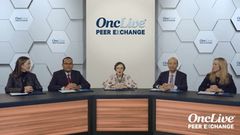
Introduction and Overview of the MONALEESA-7 Trial
Episodes in this series

Transcript:
Joyce A. O’Shaughnessy, MD: We continue to experience meaningful progress in improving outcomes for women with advanced breast cancer. In today’s OncLive Peer Exchange® panel discussion, we are going to discuss new FDA approvals, as well as emerging data from the ASCO [American Society of Clinical Oncology] 2019 Annual Meeting that will impact your clinical practice.
I am Dr Joyce O’Shaughnessy, chair of breast cancer prevention research at Baylor Charles A. Sammons Cancer Center, Texas Oncology, and The US Oncology Network in Dallas, Texas.
Participating today on our distinguished panel are:
Dr Sara Hurvitz, director of the breast oncology program and medical director of the clinical research unit at UCLA Jonsson Comprehensive Cancer Center in California.
Dr Debu Tripathy, professor and chair of the department of breast medical oncology at The University of Texas MD Anderson Cancer Center in Houston, Texas.
Dr Erika Hamilton, director of breast and gynecologic cancer research at Sarah Cannon Research Institute in Nashville, Tennessee.
And Dr Aditya Bardia, attending physician at Massachusetts General Hospital Cancer Center and assistant professor at Harvard Medical School in Boston, Massachusetts.
Thank you so much for being here. It will be fun talking to you today. Let’s go ahead and begin.
The most important data that we saw at ASCO was probably your presentation on the MONALEESA-7 trial. Could you go ahead and tell us about that?
Sara A. Hurvitz, MD: Yes, MONALEESA-7 was a uniquely designed study. There are multiple studies of CDK4/6 inhibitors—I think 7 large phase III randomized trials for the 3 CDK4/6 inhibitors. MONALEESA-7 is distinguished because it enrolled entirely a population of patients who are pre- or perimenopausal under the age of 59, a very young group of women, and randomly assigned them to receive endocrine therapy and goserelin, either with placebo or ribociclib. We published the results last year showing that we met the statistically significant improvement in the primary endpoint of PFS [progression-free survival] by 10 months.
The data really look similar to other studies of CDK4/6 inhibitors, but what we presented here is that we showed a statistically significant improvement in the median overall survival, with a relative risk reduction on the order of 29%. I think what people are impressed by is this 42-month landmark analysis where 46% of the patients in the placebo arm were alive compared with 70.2% of the patients in the ribo [ribociclib] arm. That’s a difference that really speaks to patients and physicians.
Joyce A. O’Shaughnessy, MD: Well, that’s fascinating to see that kind of survival. It’s really the very first survival data coming out of any of the CDK4/6 inhibitor trials. What do you think the implications are for clinical practice, Sara?
Sara A. Hurvitz, MD: When we evaluate a drug, we hope to see really good progression-free survival, but it’s a very high bar to set, meeting overall survival in the breast cancer world, because of this issue of crossover upon progression. We have multiple therapies that patients can receive. The fact that it was demonstrated is very exciting and promising. It’s affecting longevity in a group of very young women. On a global scale, I’m excited, because I think these data may help get CDK4/6 inhibitors funded in countries where funding doesn’t occur until substantial survival benefit has been demonstrated. I know Debu was actually the lead of this study. He’s the senior author and had a big role in this. I’m really interested in you, because we haven’t sat down and talked informally about this, and what your thoughts are about what we do on Wednesday morning when we get back to our clinics.
Debu Tripathy, MD: Well, this has been a big question. Is this setting a new standard? I don’t think it’s for any single 1 of us to say. It’s usually a consensus approach to make these determinations, but I do think that for premenopausal patients specifically, this seems like the ideal choice. I don’t know if this is a class effect or has something to do with the population. Time will tell. Aditya is working very closely with a biomarker component of this. One important aspect is that once you have a survival difference, it actually allows you to explore biomarkers associated with survival. We may discover some important new things with that.
Joyce A. O’Shaughnessy, MD: I think what we can say is that endocrine therapy alone as a first-line choice should be reserved, perhaps, for the most infirmed of our patients, where getting back and forth for monitoring, etc, is just not possible. Otherwise, the new standard of care really should be first-line endocrine therapy plus CDK4/6 inhibitor. What do you think there, Aditya?
Aditya Bardia, MD, MPH: I completely agree. Given that we now have an overall survival advantage, that is the best landmark one could ever hope for. When we talk to patients with metastatic disease, we say our goal is to prolong your survival and to maintain your quality of life. With CDK4/6 inhibitors, we can see both, and now with ribociclib in premenopausal breast cancer, we see an improvement in overall survival. To me, the use of endocrine therapy with ovarian suppression with ribociclib would be the first-line therapy to recommend for someone who is premenopausal or perimenopausal.
Joyce A. O’Shaughnessy, MD: Yes.
Sara A. Hurvitz, MD: I would just add that we are rendering these women postmenopausal. Although we demonstrated survival benefit in the premenopausal and perimenopausal patients, they’re all receiving goserelin. Biologically, I feel confident in utilizing first-line CDK4/6 inhibitors with endocrine therapy in women of any age. We have the PFS benefit, and I would be surprised if we don’t see similar survival benefits in other trials, although I would agree with my colleagues that it hasn’t yet been demonstrated.
Transcript Edited for Clarity







































